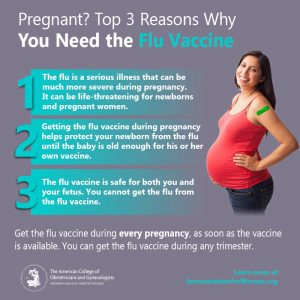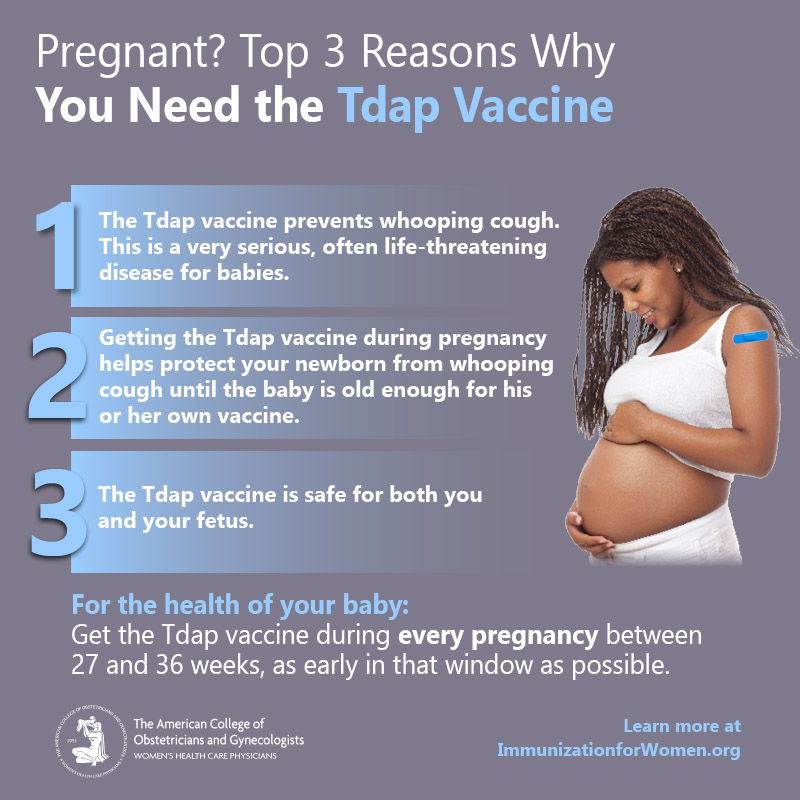 Lying on the couch watching TV is not so fun when your head is throbbing with a fever and your body aches all over. The flu takes you away from your family, out of work, out of your workout routine, and away from anything important (or fun) you might have going on. The flu is even worse — potentially fatal — if you’re pregnant.
Lying on the couch watching TV is not so fun when your head is throbbing with a fever and your body aches all over. The flu takes you away from your family, out of work, out of your workout routine, and away from anything important (or fun) you might have going on. The flu is even worse — potentially fatal — if you’re pregnant.
“Pregnant women with the flu have a significantly higher risk of complications like pneumonia, hospitalization or even death compared to women who are not pregnant,” says Dr. Leslie Davis, OB/GYN at Virginia Physicians for Women.
The good news: the nation’s leading experts at the Center for Disease Control strongly recommend vaccination to protect women and their babies from influenza and other diseases. Vaccination is safe, and it works.
“Vaccines are such a powerful yet safe weapon against disease.” Dr. Mark Hyde, OB/GYN at Virginia Physicians for Women, urges all his patients to get vaccinated, reminding that we have all benefited from vaccines over the last century. “No polio, no smallpox: Not by accident, but by vaccines.”
Misinformation has led to an unsafe decline in immunizations
So why do only 52% of U.S. adults plan to get the flu shot this season? And why are only 35% of expectant mothers receiving the flu shot and whooping cough (Tdap) vaccine, both of which are highly recommended by the Center for Disease Control for pregnant women?
The decline in immunizations is largely due to the spread of misinformation surrounding vaccines. These falsities have led to questions about their safety. “Pediatrics, obstetrics and gynecology are blessed with these extraordinary tools to prevent illness and even death,” says Dr. Hyde. “Yet there is an undercurrent of mistrust and resistance that frustrates those of us who want the best for our patients.” VPFW is aiming to dispel much of that misinformation, taking time to talk through our patients’ concerns. Their safety and the safety of their children (born and unborn) is our top priority.
Do vaccines cause autism?
This is probably the most common question surrounding the safety of vaccination. The emphatic answer from the CDC is no, “there is no link between vaccines and autism.” The onset of autism symptoms often coincides with the timing of vaccinations, which might contribute to the misunderstanding. However, the CDC insists that there is no causal relationship between the two.
Can you get the flu from the flu shot?
Whether you are pregnant or not, “you cannot get the flu from the flu vaccine,” says Dr. Davis. The vaccine given in pregnancy contains no live virus.
Who should get the flu shot and how often?

EVERYONE. Well, everyone 6 months and older. The flu shot is especially important for anyone with high risk of influenza complications, including:
- Pregnant women
- Older adults
- Young children
- Anyone with chronic medical conditions (asthma, obesity, cancer, COPD, cystic fibrosis, diabetes, HIV/AIDS, kidney or liver disease, etc.)
It’s important to get the flu shot every year. Why? The CDC reports that “a person’s immune protection from vaccination declines over time, so an annual vaccination is needed to get the ‘optimal’ or best protection.”
The flu is worse for pregnant women
Influenza can be fatal for pregnant women and their unborn children. The CDC reports that women with the flu are more than twice as likely to be hospitalized if they are pregnant. Pregnant women accounted for 24–34% of influenza-associated hospitalizations during the 2017–18 flu season. However, a 2018 study showed that the flu shot reduced a pregnant woman’s risk of being hospitalized with flu by an average of 40 percent.
“The immune system, heart and lungs just work differently in pregnant moms,” says Dr. Leslie Davis, OB/GYN at VPFW. “If you’re pregnant and you haven’t had your flu shot yet, please ask at your next visit. Healthy mom, healthy baby!”
Which vaccines are recommended for pregnant women?
The flu shot and the Tdap vaccine are the only two vaccines strongly recommended by the CDC for pregnant women. However, only about 35% of pregnant women receive both the flu and whooping cough (Tdap) vaccine.
The CDC and ACOG recommend that all pregnant women receive the flu vaccine at any time during pregnancy and the Tdap vaccine as early in the 27–36-weeks-of-gestation window as possible.
What is the Tdap vaccine?
 The Tdap vaccine protects against whooping cough. We know — “whooping cough” sounds like something that might have claimed the life of your little brother on the Oregon Trail—but it is making a comeback today. It starts out with cold-like symptoms that eventually develop into rapid coughing, often with a “whooping” sound. It is highly contagious and can lead to exhaustion, vomiting, cracked ribs, or even death.
The Tdap vaccine protects against whooping cough. We know — “whooping cough” sounds like something that might have claimed the life of your little brother on the Oregon Trail—but it is making a comeback today. It starts out with cold-like symptoms that eventually develop into rapid coughing, often with a “whooping” sound. It is highly contagious and can lead to exhaustion, vomiting, cracked ribs, or even death.
How pregnant women can protect their babies by getting vaccinated
When an expectant mother receives the flu shot and Tdap vaccine, she is not just protecting herself, but also giving her developing baby early protection until the baby is old enough to be vaccinated.
The CDC reports that 69% of pertussis (whooping cough) deaths occur in infants less than two months old, and the highest instances of flu deaths occur in babies younger than 6 months. These young babies are highly vulnerable because they can’t be vaccinated before a certain age. They are not able to get the whooping cough vaccine until they are 2 months old or the flu vaccine until they are 6 months old.
This is why it is so crucial for pregnant moms to get vaccinated—their vaccinations provide their babies with early protection that carries through until after the babies are old enough to be vaccinated themselves.
Why the whole family should get vaccinated
If you’re pregnant, you likely won’t be the only one getting close to your baby after birth. Family members young and old will want to hold and touch your adorable little bundle. That’s why VPFW recommends they all stay up-to-date on their flu shot and whooping cough vaccinations. Healthy family, healthy baby!
VPFW patients can get the flu shot and Tdap vaccination at any of our six locations. Schedule your appointment today!
To make an appointment with an OB/GYN provider at one of our Richmond, VA, locations, call VPFW at 804-897-2100 or message us to schedule online.